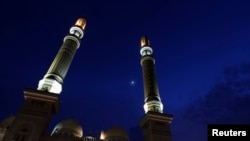Yemen's dominant Houthi movement said Saturday a pause in fighting to last until the end of the Muslim holy month of Ramadan was under discussion with the United Nations to allow for deliveries of humanitarian aid.
Houthi spokesman Mohammed Abdul Salam said in a post on his Facebook page he had met U.N. special envoy to Yemen Ismail Ould Cheikh Ahmed on Friday to discuss the matter.
An Arab coalition has been bombarding Iran-allied Houthi forces and allied army units since March in a campaign to restore exiled President Abd-Rabbu Mansour Hadi to power.
The U.N. envoy is also holding discussions with the pro-Hadi government in Saudi Arabia to push for a pause, sources said.
The U.S. State Department on Thursday called for a "humanitarian pause" in the conflict during Ramadan to allow international aid groups to deliver urgently needed food, medicine and fuel.
Peace efforts
The European Union said Friday it supported U.N. efforts to secure a lasting, predictable and sustainable humanitarian cease-fire and demanded that Saudi-led forces ease restrictions on entry of ships to Yemeni ports.
"The details are still unclear in terms of a starting date and duration of a humanitarian pause; however the special envoy believes that there is ground for optimism that the parties will agree in the coming days," said U.N. spokesman Ahmad Fawzi.
Both sides largely observed a five-day truce brokered by the United Nations in May to allow in fuel and medicine to civilians trapped in conflict zones.
The Houthis captured the Yemeni capital Sana'a last September, pushing Hadi's government aside and began expanding south and westwards. The president fled the port of Aden in March after the Houthis advanced on his southern stronghold.
Saudi Arabia, determined to thwart any arms deliveries to the Houthis, has imposed a near total blockade on a country heavily reliant on imports.
Nationwide fuel shortages have spread disease and suffering in arid Yemen, where access to water usually depends on fuel-powered pumps and more than 20 million people, 80 percent of the population, needs some form of aid, according to the United Nations.





